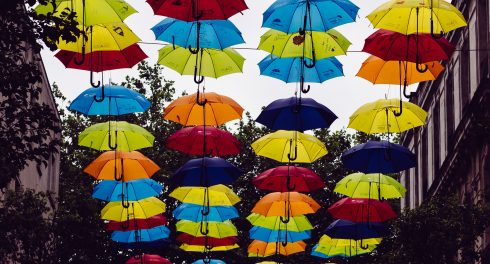In case you missed it…
The latest in the series of new index releases to start the year? Transparency International’s 2017 Corruption Perceptions Index. The TI team highlight a correlation between civic space and corruption suggesting a vicious circle – corrupt governments attack dissidents, and the erosion of civil liberties decreases capacity to hold governments accountable, thereby resulting to greater abuse and impunity. Findings from last month’s Open for Business report (and underlying survey data – see p58) point to a similar correlation between corruption and inclusivity, namely that LGBT+ discrimination often goes “hand in hand with corrupt practices and a lack of openness.”

Overall, there has been little to no progress in majority of the countries with regards to corruption perception, with more than two-thirds scoring below average. The highest performing countries? New Zealand and Denmark. Ukraine is at 130. Last week we featured the corruption case on the Eurovision Song Contest involving Ukraine’s former President. Further investigations from the BBC untangles the web of corruption around the stolen billions, this time, involving a helipad. Meanwhile, Oxfam International receives another blow as its chair is arrested in Guatemala on corruption charges related to his tenure as a government minister.
The TI report suggests Africa, Latin America and Asia as the most corrupt regions. However, using data from Tax Justice Network’s Financial Secrecy Index, Andres Knobel suggests that while perceived to have low levels of corruption, it is European and North American countries that are enabling global corruption and illicit financial flows.
Our number of the week – two. Barely a few months into 2018 and two journalists have already been reported killed. The Committee to Protect Journalists have recorded 1,278 victims since 1992. CPJ Director of Development John Weis argues that anti-press rhetoric of Trump and his ilk “has emboldened autocratic leaders around the world who use similar language to justify their own repressive policies.” Who is coming to their defense? Donors have stepped up support, according to Jon Pattee, which includes TAI members Omidyar Network, Ford Foundation and MacArthur Foundation. Media support is subject of a joint session of TAI and OECD GovNet member donors this week.
That is encouraging, but Monica Bulger and Patrick Davison caution against simply scaling up media literacy efforts. Recent media literacy initiatives should undergo careful evaluation. Here are five recommendations to guide media literacy programming. Also, this report on setting standards for media content, and who to hold accountable, might be useful
What of increased support for civic participation? The new OGP Trust Fund (see call below) is one new channel, while we are seeing renewed interest in the US in promoting civic engagement and advocacy among direct service nonprofits. However, bandwidth is a challenge. Using human-centered design, the Community Resources Exchange provide ways by which organizations can integrate civic engagement into their core programs rather than creating a new standalone program. Some might be inspired by citizen engagement in Iceland – learn more from Robert Bjarnason of Citizens Foundation. Lest this seem faddish, a reminder of how voter participation improved budgets in ancient Greece. The point? Modern politicians should talk openly about public finances.
The Open International Day is next week. Do check out what’s happening in your part of town on March 3 and join. Perhaps this year indeed, will be the year of data culture? Leading global and Latin American open data and development organizations sent a letter urging Argentinian President Mauricio Macri to make open and clean public contracting a key part of the G20 agenda. In Europe, suggestions and comments are being solicited for the UK Open Government Plan for 2018-2020. While in the Netherlands, more than a hundred municipalities publicly released policy documents and launched WhereGovernment – an application to reuse data.
What is the future of philanthropy and digital civil society in 2018? Among Lucy Bernholz’s predictions: grants towards financial technology, voice-activated giving, lack of regulation on online political advertising in the US, and tech companies increasing their philanthropy and political giving.
Lucy’s push on the need to address digital privacy concerns would have found many ready ears at the sold-out Fairness, Accountability and Transparency conference this past weekend. An event that pulls together computer and social scientists with interesting results. Given the research cases presented from manipulating online advertising to risks of biases in automated decision making, AI Now offered timely advice with its call for public agencies to conduct algorithmic impact assessments for any systems that make major decisions about people.
While Bill Gates urges fellow billionaires to pay “significantly” more taxes, the newly rich crypto-billionaires may instead be seeking ways to evade taxes. Adam James claims cryptocurrency investors are heading en masse to Puerto Rico to protect their investments. A safe haven, or the new tax haven? Could the same technology also be their undoing? Enrique Aldaz-Carroll says yes – arguing blockchain can be a tool to fight corruption. Nigeria’s Minister of Finance offers a different approach – designate tax malpractice as corruption to support efforts to sue companies.
The Center for Global Development argues that policiesto counter money laundering and other financial crimes further marginalize the already-disenfranchised sectors such as migrants and their families, small businesses in need of capital, and aid recipients. To the rescue? Tehnology. Vijaya Ramachandran and Jim Woodsome break down how six emerging technologies, from big data to biometrics that could help address bank de-risking.
The perennial question in philanthropy – how can we do better? Open Impact’s latest report talks about the “giving journey” of Silicon Valley’s new donors. What are the motivations and barriers in giving? How can donors give more, and more effectively? Katherine Fulton discusses limitations of strategic philanthropy, while Marc Gunther lays out how big foundations failed to build a robust political movement for climate action. What lessons for our work in the transparency and accountability field?
Might individual donors find new ways to make an impact? Anne-Meike Fechter charts how citizen aid (aka “DIY foreign aid”) is on the rise – enthusiastic individuals creating their own micro-organizations or small-scale aid projects, often with strong grassroots connections.
Finally – the 2017 Global Go To Think Tank Index Report is out. Top of the pile overall? Brookings and the French Institute of International Relations. Top for international development specifically? Korea Development Institute (KDI) and Institute of Development Studies.
TAI spotlight

TAI staff and members hold series of workshops in Nigeria to learn more on how to increase data for accountability uptake at the country level. Watch out for upcoming blog posts on our key learnings!
- “We Have To Try.” Three Questions for Larry Kramer, President of the Hewlett Foundation – Larry Kramer on how wealthy private philanthropists influence traditional foundation giving, on how to address power imbalance between funder and grantee, and on what keeps him up at night
- Understanding the Social Impacts of Artificial Intelligence – The motivations behind Omidyar Network’s grant to AI NowThe motivations behind Omidyar Network’s grant to AI Now
- Ford Foundation Named One of Fast Company’s 50 Most Innovative Companies In The World – Find out how Ford Foundation is leading innovation in social change work
- Taking Impact Investment Past the Tipping Point – Why Omidyar Network is investing in the Global Steering Group for Impact Investment
Of potential interest…
- Investigative Journalists Face Threats, Harassment and Smear Campaigns – Attacks on media and activists continue. Civicus has monitored cases in Kosovo and Macedonia
- The FCC’s Order Gutting Net Neutralist is Now Official – But The Fight Is Just Getting Started – Not the end of the road yet for net neutrality and here’s what you can do to reverse. A massive protest is scheduled for February 27
- Should Data Scientists Adhere to a Hippocratic Oath? – Is it high time for self-regulation within the tech industry?
- Facebook and Google Could Soon Have Much Higher Taxes in the UK, Report Says – European authorities have been mulling over higher taxes for tech giants. The UK might act first.

- Independent Review Panel Members (Accountable Now) – March 11
- Building Resilient Roots – Call for pilot projects to explore factors to increase public support and trust in CSOs coordinated by Accountable Now, March 18
- Gender Data Impact: Call for Stories – March 8
- Join the OGP Local Program: Call for Expressions of Interest – March 9
- Open Society Initiatives for East Africa

- How Can Supreme Audit Institutions Help Curtail Corruption? – Ferbruary 28 (Washington DC, USA)
- Data Labs: Improving Access to Government Data (online) – March 1
- Open Data Day 2018 – March 3 (Global)
- Open Data Day 2018: Help complete the 2018 U.S. City Open Data Census – March 3 (Washington, DC, USA)
- Innovations in Participatory Democracy Conference – March 8-10 (Phoenix, Arizona, USA)
- Working with Whistleblowers: A Sunshine Week Training for Public Interest Advocates – March 15 (Washington, DC, USA)
- Toward Greater Impact: Building Stronger Funder-Nonprofit Relationships – March 20 (California, USA)
- Data for Development Festival – March 21-23 (Bristol, UK)
- Collective Impact Convening– April 3-5, 2018 (Austin, TX)
- A Return to ‘Governance in Dark Times’? Creating Spaces for Citizen Dialogue, Encouraging Engagement in Public Life, and Ensuring Government Transparency and Accountability – April 12-14 (Orlando, Florida, USA)
- TicTec 2018: The Impacts of Civic Technology Conference– April 18-19 (Lisbon, Portugal)
- Grantmakers for Effective Organizations National Conference – April 30 – May 2, 2018 (San Francisco, CA)
- RightsCon (human rights in the digital age) – May 16 – 18 (Toronto, Canada)
- OGP Global Summit 2018 – July 17- July 19 (Tbilisi, Georgia)
- The Future is Open: 5th International Open Data Conference – September 20-21, Buenos Aires


